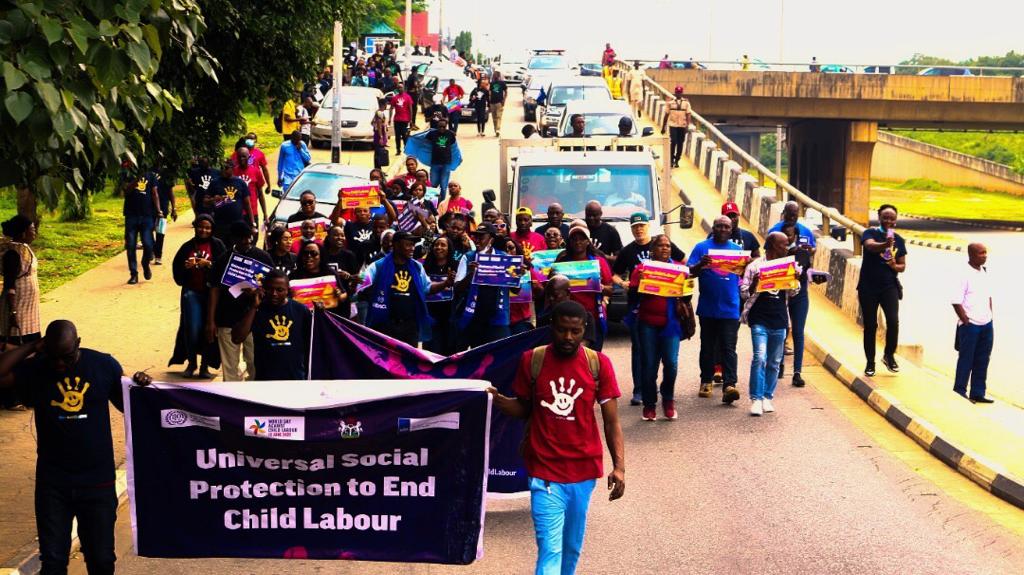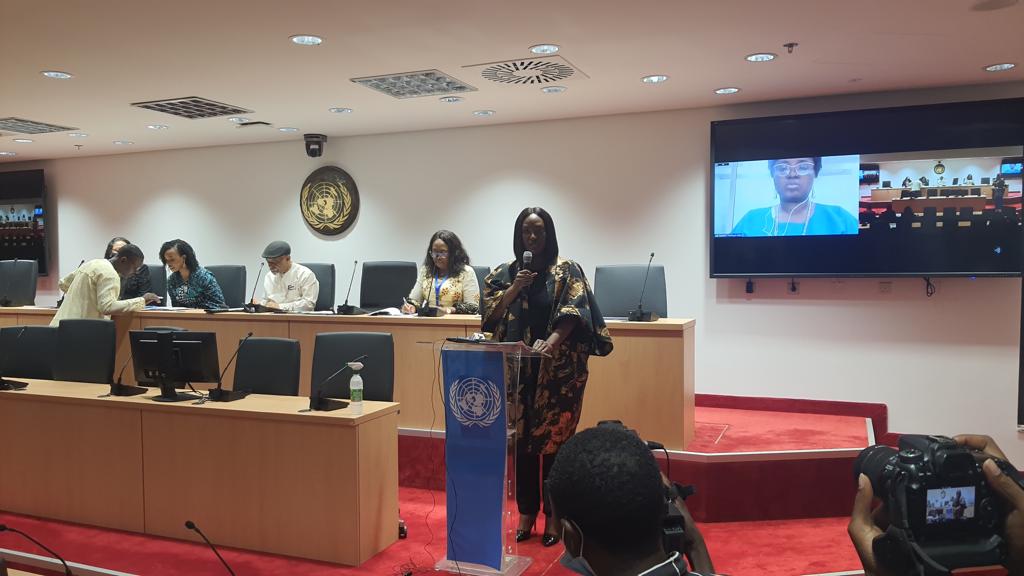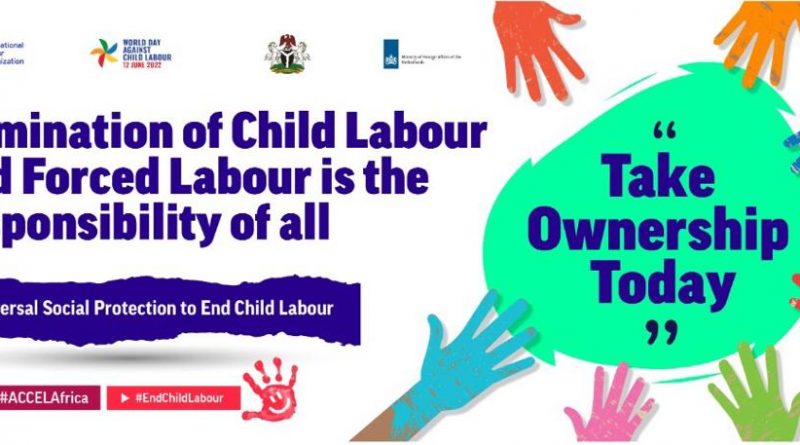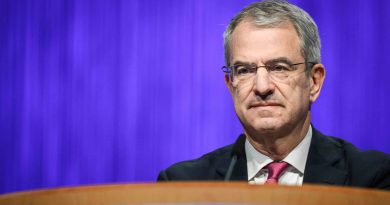Participate Actively In Fight Against Child Labour, ILO Urges Nigerian Media
In this two day event, the International Labour Organization interacts with the mass media and urban public on the urgent need to scale up awareness on the dangers of child labour and increase social protection covers to prevent, manage and eliminate the scourge from Nigeria, as recommended by the ‘Durban Call to Action’ seeking to accelerate multi-stakeholder efforts for the prevention and elimination of child labour in line with Sustainable Development Goal Target 8.7.
The International Labour Organization (ILO) has urged the mass media in Nigeria to fulfil its social responsibility to the public by consistently educating audiences on international labour standards, fundamental rights at work and the dangers of child labour, while reporting ethically in consideration of the best interests of child labour victims.
Vanessa Phala, the ILO Country Director for Nigeria, Ghana, Liberia, Sierra Leone, and Liaison Office for the Economic Community Of West African States (ECOWAS) made this appeal during the ‘Media Engagement’ and ‘Walk for the Nigerian Child’ both in Commemoration of the World Day Against Child Labour (WDACL), themed “Universal Social Protection to End Child Labour”, at the Conference Hall of the United Nations House, Abuja on Thursday, 28 July 2022, and through the central business district of Abuja City on Friday, 29 July 2022.
According to Director Phala, calling the attention of the public to the dangers of child labour to society will accelerate actions by stakeholders to resolve concerns on collective safety, given the connection between child labour and insecurity.
“We must realize that if we do not set and sustain the agenda on the dangers of child labour, stakeholders may delay in taking urgent and active steps required to stop it, thereby prolonging concerns on insecurity over extended periods.” – Director Phala.
“The presence of arms and ammunition in the scramble for resources is shrinking safe spaces, exposing children to violence, and fuelling a cycle of crime by providing a steady pool of recruits for criminals from one generation to the next”, Director Phala added.
In addition, the Director called on the Government of Nigeria to increase investments in social protection by improving child and family benefits, fiscal spaces, legal frameworks, and coverage of rural areas with social protection programmes to reach the most vulnerable.
Director Phala further called on trade unions to focus on the participation of children within the legal working age (15-17 years) in making decisions that affect their services and well-being at work.
A recently conducted ILO research in partnership with UNICEF on “The role of social protection in the elimination of child labour’ reveals that 1.5 billion children worldwide, aged 0-14, receive no family or child cash benefits while more than 160 million children – 1 in 10 children aged 5-17 – are still engaged in child labour, and progress has stalled since 2016.
Speaking on behalf of the United Nations Children’s Fund (UNICEF) Country Representative Peter Hawkins, the UNICEF Acting Chief of Social Policy, Temi Esteri Fet’era encouraged the media to disseminate information on child labour and sensitize the population about the risks and harm of child labour, while observing the need for routine updates of evidence on children.
“Social protection is not only about human rights and dignity, but it is a smart public investment choice. A country that invests in its people, particularly children, also invests in its future and development.” – UNICEF Country Rep., Peter Hawkins

According to the UNICEF Country Rep., 14 million children in Nigeria were engaged in child labour before the Covid-19 pandemic and there are indications that the social and economic impacts of the pandemic have increased the numbers significantly.
The ILO’s ACCEL Africa Project in Nigeria is accelerating action against child labour in the cocoa and Artisanal Gold Mining (ASGM) supply chains in Ondo, Niger and Osun states specifically where child labour is prevalent through production and supply chains.
Representing the Federal Government of Nigeria, Dr. Chris Ngige, the Minister for Labour and Employment highlighted the social protection efforts of the government as – diversification into agriculture, social investment programmes, review of existing legal frameworks to combat child labour including the ratification of ILO Conventions No. 138 on the minimum age for work, and Convention No. 182 on the worst forms of work.
In addition, the Minister acknowledged the financial and technical support given by the ILO for the conduct of the Child Labour/Forced Labour Survey and the review of the National Policy and National Action Plan on the Elimination of Child Labour and Forced labour. (2021 – 2025).
Dr. Ngige further urged the mass media to ensure improvements in the coverage of issues related to child labour, forced labour, human trafficking, and modern slavery to support the effective elimination of the vices from Nigeria by 2025, in line with Sustainable Development Goal Target 8.7.
Speaking via zoom, the representative of the Nigeria Employers Consultative Association (NECA), Nike Ajala underscored the importance of institutionalized and effective social protection programmes in ensuring that children are allowed to fulfil their full potential.
According to Nike, the development and launch of a code of conduct to guide practices of companies in the organized private sector; development of a guidance tool for business, research and capacity building of child labour focal persons in member companies; capacity building and formalization of associations in the cocoa and mining sectors to ensure the institutionalization of fair labour practices and decent work in line with extant labour laws and ILO Conventions; and advocacy for increased allocation of corporate social responsibility resources towards child labour eliminating initiatives, are some of the social protection efforts of the association.
On Friday, 29 July 2022 Members of Nigeria’s National Steering Committee on the Elimination of Child Labour (NSCCL) led a procession of children advocates on a ‘Walk for the Nigerian Child’ from the Federal Secretariat, through the busy Central Business District, to the Ministry of Finance, Budget and National Planning.
Participants at the walk include: the ILO Country Director Vanessa Phala, the Permanent Secretary of the FML&E Daju Kachollom (Ms Alliance), the Acting Director of the Inspectorate Department of the FML&E Dauda Ajuwon, representatives of the Federal Ministry of Mines and Steel Development, Federal Ministry of Women Affairs and Social Development, National Bureau of Statistics, Federal Ministry of Agriculture and Rural Development, Child Protection Network, Trade Union Congress, Nigeria Labour Congress, NECA, Ministry of budget and National Planning, Human Rights Commission, ILO staff, UNIDO, Child and Youth Protection Foundation and other members of the National Steering Committee on the elimination of child labour.

Through the framework of the Dutch Government funded ACCEL Africa Project in Nigeria, the ILO has partnered with the Government of Nigeria and other social partners to: strengthen legal frameworks for social protection through capacity building on National Legal drafters on developing a National Social Protection Harmonization Bill; adapt the recently validated Social Protection Policy; extend social protection to the informal economy; support for child labour victims with health and educational services (such as enrollment or re-enrolment in school, school bags, school sandals, notebooks, textbooks, sandals), and psychosocial support to those unfairly exposed to child labour and traumatized. Working with Federal Ministry of Labour and Employment and Child and Youth Protection Foundation, the ILO has supported the compilation and simplification of existing national laws and policies on child labour and child protection, in addition to interventions reaching over 1,409 children with various prevention, protection, and withdrawal services.The Project has also trained and certified 62 teachers, care givers and other professionals to Support Children’s Rights through Education, Arts, and the Media – using the ILO’s SCREAM Module and is working with a team of intellectuals in the University of Ibadan to develop a curriculum on the elimination of child labour.
To sustain an enabling environment for the elimination of child labour, the ACCEL Africa Project facilitated the development and validation of Nigeria’s National Policy and National Action Plan on the elimination of child labour and forced labour in April 2021, with the support of the Minister of Labour and Employment in collaboration with the Minister for Women Affairs and Members of the National Steering Committee on the elimination of child Labour in Nigeria. Also, six states (Oyo, Ogun, Osun, Ondo, Niger, and Lagos) were supported to adapt the National Action Plan on the elimination of child labour to the contexts of child labour in their states.In addition to interventions reaching over 1,409 children with various prevention, protection, and withdrawal services, the ACCEL Africa Project is scheduled to distribute starter packs to over 800 men and women entrepreneurs in project communities trained and mentored on the ILO Start Your Business (SYB) Module, to help them bring their business ideas to life, develop themselves and impact their communities.




